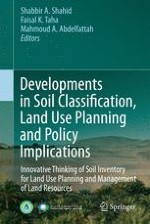2013 | OriginalPaper | Buchkapitel
38. New Trends in Land Degradation and Desertification Research and the Role of the Association DesertNet International in Sharing Knowledge and Promoting Sustainable Land Management
verfasst von : Pandi Zdruli
Erschienen in: Developments in Soil Classification, Land Use Planning and Policy Implications
Verlag: Springer Netherlands
Aktivieren Sie unsere intelligente Suche, um passende Fachinhalte oder Patente zu finden.
Wählen Sie Textabschnitte aus um mit Künstlicher Intelligenz passenden Patente zu finden. powered by
Markieren Sie Textabschnitte, um KI-gestützt weitere passende Inhalte zu finden. powered by
